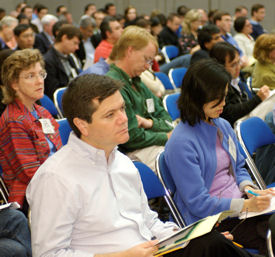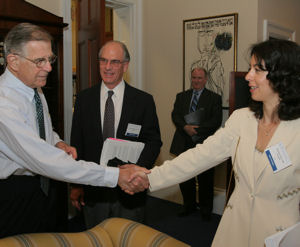Capital location inspires political theme for annual meeting
Washington, D.C., is lending not just a location but also a theme to many of the offerings at Internal Medicine 2008.
Washington, D.C., is lending not just a location but also a theme to many of the offerings at Internal Medicine 2008, to be held in the city from May 15-17, with pre-courses on May 13 and 14.
It's the first time since 1993 that the College's annual meeting has taken place in the nation's capital, and the setting will offer opportunities for attendees to exercise, as well as study, both medical and political leadership. In addition to its concurrent scheduling with Leadership Day (see related story) , the meeting will feature presentations by current, former and future leaders of the nation's health care system.
“We're trying to take advantage of the D.C. location to get some perspectives that you couldn't have in another city,” said Robert B. Doherty, ACP's Senior Vice President of Governmental Affairs and Public Policy.

The featured perspectives will likely include those of the next U.S. president. The College has invited representatives of all the major presidential candidates to present their health care platforms at Internal Medicine 2008 and respond to questions from attendees about their candidates' plans for the future of the U.S. health care system.
The meeting's keynote speaker, Karen Davis, PhD, president of the Commonwealth Fund, will also address the future of U.S. health care when she speaks about patient-centered medical homes on Thursday morning.
Other current and former health care policy leaders will talk about their experiences during a Friday afternoon session on “Internists in Government.” The session will be conducted by ACP members who have served in the federal government as elected representatives or appointed officials.
“This is an insider's look at being a doctor actually in a position to make government policy–what is that like? What do you learn from that? What lessons are there for internists about how to be advocates?” said Mr. Doherty.
Internists who are interested in leading and advocating for medicine can also take advantage of the College's new leadership development program, which will begin during Internal Medicine 2008. “It's designed for young Fellows to cultivate future leaders of the College,” said Barbara Licht, ACP's Director of Educational Meetings and Conferences.
The Leadership Enhancement and Development (LEAD) program will kick off with a pre-course on Wednesday, titled “Essential Competencies for the Emerging Leader.” The one-day course will examine four areas of leadership—communication, team building, negotiating and conflict resolution—and offer participants the chance to practice their skills in small groups.
Additional courses during the meeting, including “Negotiation Skills for Women Physicians” and “How to Be an Effective Leader,” will continue the LEAD program's theme of providing internists with the skills, knowledge and experiences necessary for effective leadership in medicine and the community.
Leadership also will be this year's focus for a tradition of the annual meeting—the History of Medicine series. “What happens when the national leader is incapacitated by ill health?” the course asks. In sessions on Thursday and Friday, a former presidential physician, a medical historian and a physician who profiled national leaders for the CIA will help to answer that question.
New offerings
Other new offerings for this year include a Practice Management track and two half-day Maintenance-of-Certification SEP module pre-courses.
The new track includes two pre-courses and 13 sessions focused on practice management issues such as electronic health records, performance measurement and practice efficiency. “It's designed to help people deal with the business of medicine. For people who come to the meeting and want to focus on that, the track is an efficient way for them to navigate through the program and identify which of the 260 sessions are right for them,” said Ms. Licht.
The Maintenance-of-Certification half-day SEP-Based Learning Sessions were inspired by changes that the American Board of Internal Medicine has made to its self-evaluation process, reducing the number of questions on its modules from 60 to 25. On Wed., May 14, attendees can participate in live self-study sessions on the 2007 Update modules in Hospital-Based Internal Medicine or Office-Based Internal Medicine or make a whole day of it by attending both sessions (for which a package rate is available).
If you're looking for some lighter fare, Internal Medicine 2008 will feature several new courses which should be very entertaining as well as educational, according to Douglas S. Paauw, FACP, chair of this year's scientific session.
A course called “All I Know of Medicine I Learned at the Movies” on Thursday will highlight diseases that have been featured in major movies. “That was a new one that we'd never seen and we thought that sounded really, really fun,” said Dr. Paauw.
Another new course will help attendees enjoy themselves more all year long, predicted Dr. Paauw. Book author Emily R. Transue, FACP, will teach about the importance of storytelling in medicine in a course titled “Embracing the ‘Story’ in the ‘History’” on Friday morning.
“It's the use of patient's stories to learn about your patient both to become a better doctor but also to better enjoy the practice of medicine. What are the things we learn from our patients that really stick with us and make being a doctor worthwhile?” said Dr. Paauw.
Dr. Paauw noted a few other new sessions that he is particularly anticipating, including several physical diagnosis talks and a Thursday course on translation of research into practice. “We get a lot of research that says we should be doing this vaccine, this treatment, this preventive thing, but when you take all the research, what do you get the most money out of? What helps the most people for what you do?” he said.
Dr. Paauw himself will teach a Friday class called “Medical Mythology” to address common misconceptions in medicine. “Probably the most common example is replacement of vitamin B12. Doctors believe that you need to give injections for people that have pernicious anemia. There's lots of evidence that it can be given orally and it's just as effective or more effective,” he said. The course will cover the evidence base on this and a number of other clinical “myths.”
As usual, the Scientific Program will end with a recap of the meeting's highlights followed by the Doctor's Dilemma competition. The concluding session, which has been growing in popularity, attracted more than 1,000 attendees last year, according to Ms. Licht. “That's a very large audience for a session late on Saturday. It's a very worthwhile session that ends the meeting on a high note,” she said.





